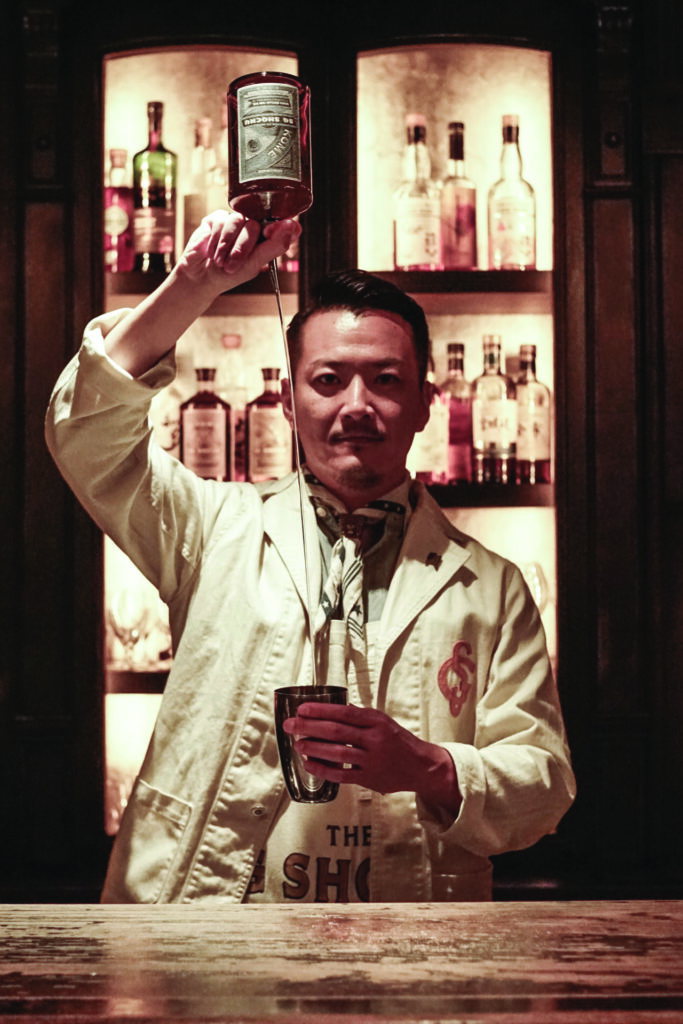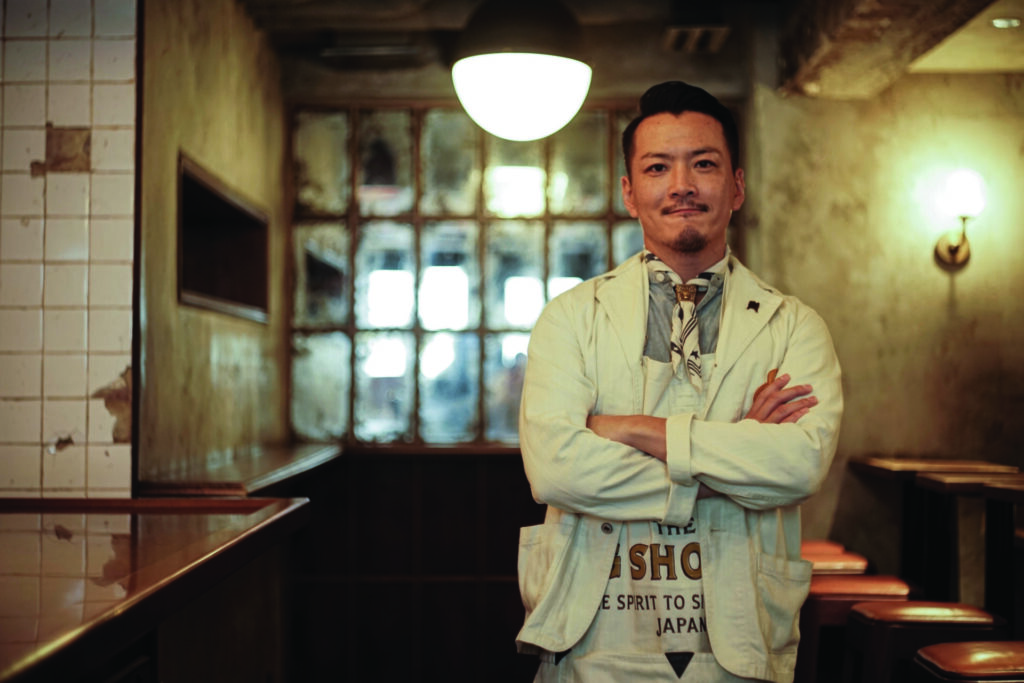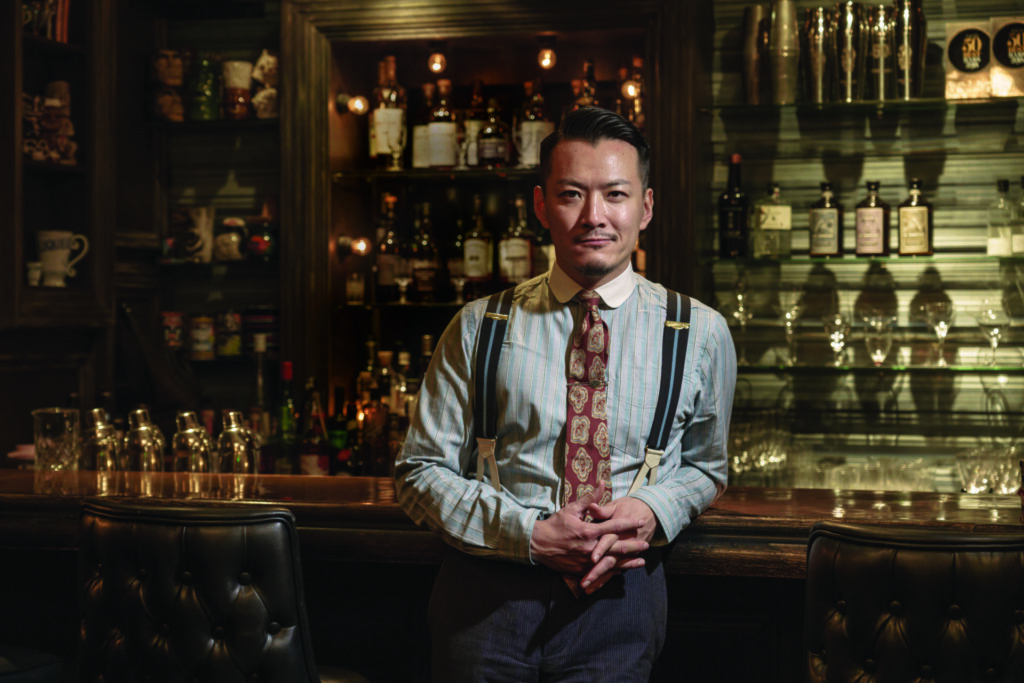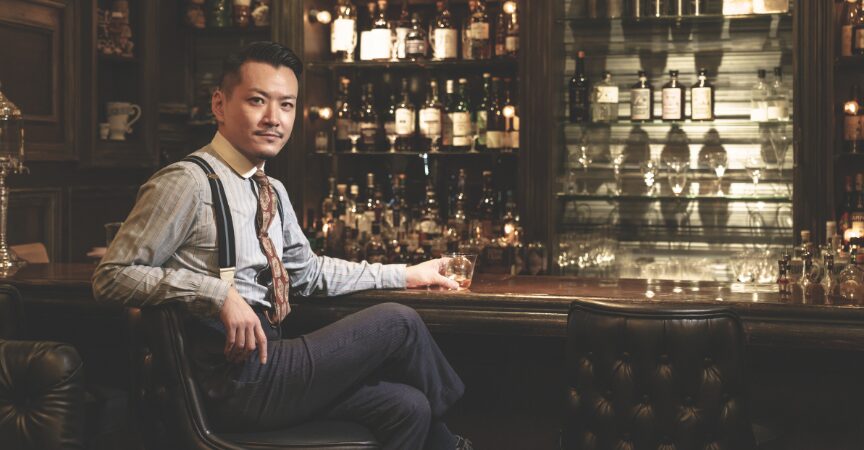Through the Looking Glass with Global Cocktail Master Shingo Gokan
Shingo Gokan didn’t set out to change the cocktail world. In fact, if you’d asked him at any point in his early years behind the bar, he would have told you he was only staying long enough to learn something useful before returning home to Japan to take over his father’s metal manufacturing business. But Gokan’s story is a reminder that life has a way of throwing the best-laid plans into the blender.
What began as a short-term gig fueled by curiosity has evolved into an empire. Today, as founder of SG Group, Gokan stands at the helm of more than 20 bars at 12 addresses across four countries, each one uniquely designed and narratively rich. He also worked with master distillers to develop and launch his own brand of shochu, The SG Shochu, created for bartenders to perform in cocktails without losing its distinct Japanese character. He is, arguably, one of the most influential, creative and thoughtful hospitality entrepreneurs of his generation. His venues are studied globally for how they balance detail, story and style, and his drinks have become lasting symbols of innovation. Yet, as his portfolio has expanded from Tokyo to Shanghai, and Hong Kong to New York, Gokan has stayed true to the instincts that first captivated him: a relentless focus on craft, a restless curiosity, and the pursuit of spaces that feel as personal as they are exceptional.
“If I can enjoy the space, the guests can enjoy it,” he says. “That’s my rule. If I’m bored, they’ll feel that.”
And after more than two decades, Gokan shows no sign of boredom.


The Weight of Destiny.
To understand Gokan’s career, you have to understand what was supposed to happen.
He grew up in Japan, the son of a factory owner. His father’s business made metal components for cameras and other precision equipment—a trade built on discipline and inherited responsibility.
“Since I was a baby, they’d been telling me I would take over,” Gokan says. “It was just the way it was supposed to be.” This shadow shaped his early career. Even as bartending pulled him in—first only part-time, then into his first full management role by the age of 20—he kept telling himself he was just preparing. “I started bartending at 18 as a part-time job,” he says. “In Japan, you can’t drink until you’re 20, but you can work behind the bar. So, I thought, why not? But it was never supposed to be forever. I just wanted to experience something different.”
It was in those early years that his “two-year rule” emerged: two years in any job before moving on. Bartending was never supposed to stick, but then came the comment from a customer that changed everything. “One of my regulars told me, ‘You should go to New York,’” he recalls. “And I thought, ‘Yeah, why not?’ So, I left.”
The Birth of Inspiration.
Gokan was experienced in Japan, but he found New York indifferent to his skill and technique. The city had its own hierarchy and bar culture, so he had to start from the bottom. “When I got to New York in 2006, I couldn’t speak English. I didn’t have money. I didn’t have any status,” he says. “And the style of bartending was completely different than what I knew.”
In Japan, bartending is quiet and composed. Guests keep a respectful distance, watching the precision of the bartender, soaking in the mastery and technique. It is controlled, and extremely refined. New York, however, was a chaos he couldn’t prepare for. “It’s about speed, entertainment and fun,” Gokan says. “The vibe is everything—people want to feel the energy. Remember, there was no YouTube or social media back then, so I had no idea what I was walking into. Every day, I just tried to figure it out.”
Slowly, Gokan began to adapt, realizing that what had worked in Japan couldn’t work here, at least not on its own. He felt there was something new to be made from the clash of styles. “I wanted to take the best parts of Japanese bartending—the precision, the technique—and combine them with the energy and fun of New York,” he says. “That became my focus and what I wanted to build.”
His turning point came with Angel’s Share, the iconic East Village speakeasy where Gokan worked for nearly a decade. There, he honed his philosophy of hospitality and balanced his dual influences from Japan and New York. These lessons stayed with him, influencing the way he designed his future bars to offer multiple experiences under one roof.
By the time Gokan won the Bacardi Legacy Global Cocktail Competition in 2012 with his legendary Speak Low cocktail, he was nearly a decade into his New York life. The weight of his family expectations was still there—but it had started to feel different. The future that once felt inevitable now seemed less certain. And for the first time, Gokan allowed himself to admit that bartender might be his permanent calling. “When I told my dad I wasn’t coming back to take over, he wasn’t happy,” Gokan says. “He thought bartending was something I was doing to learn from other industries. But when I said, ‘No, this is my path,’ he was pissed, which gave me extra motivation to succeed as an entrepreneur. I wanted him to understand why.”
Over the years, his parents have come around. “When I visit home,” Gokan laughs, “My mom says, ‘You made the right choice.’ And my dad… well, the house is full of my articles and pictures.”
Few moments in his career have carried the same weight as stepping behind the bar at The Savoy in London—a place so deeply embedded in cocktail history that, for many bartenders, it represents the pinnacle of the craft. “For us, in Japan, The Savoy’s cocktail book is like the Bible,” Gokan explains. “Everyone reads it when they start bartending. So, to be invited to do a guest shift there was like a dream.”
In 2012, fresh off his Bacardi Legacy win, Gokan became the first guest bartender in the hotel’s storied history. “I was still so young. I was excited, but honestly, I couldn’t really remember all the details afterward because I was just too nervous,” he admits. But that night left its mark, and more than a decade later, in 2024, The Savoy invited him back for its 135th anniversary. This time, it was The Savoy who approached him directly. “That was very special. To be asked back, to create new cocktails inspired by their classics, and to do it alongside people like Steve Schneider and the former head bartenders… it was the highlight of my career. There’s really nothing bigger than that for me.”


The Art of Storytelling.
For Gokan, opening a bar is never just about crafting and serving drinks. It’s about world-building. Each of his venues exists as a kind of living story, where every detail—from the lighting and music to the glassware and uniforms—is chosen with the same intentionality as the ingredients in his cocktails. In Gokan’s world, you’re not walking into a bar, you’re being invited into Gokan’s imagination. “My bars are always based on places I want to be,” he explains. “That’s the starting point. If I enjoy it, if it feels authentic to me, then I believe the guests will feel that, too. But I don’t want to create the same bar over and over. I want each one to have its own world, its own feeling, its own story.”
At The SG Club in Tokyo, that desire for storytelling, layered with personal touches and unexpected moments, is tucked into what most would dismiss as wasted space. In a narrow nook originally intended for liquor storage you’ll find an active shoeshine booth. While it might seem like an odd addition at first glance, the choice is deeply personal. “When I was travelling in New York and Mexico, one of my favorite things was getting my shoes shined while having a drink,” Gokan recalls. “It’s such a small pleasure. Just sitting there, having someone carefully working on your shoes, while you sip something good and watch the world go by. I thought, why not build that into the bar? Why not give guests that same little surprise moment?” And so, what could have been a utilitarian corner became one of The SG Club’s most distinctive features. Guests can sip on an expertly crafted cocktail while a professional shines their shoes, transforming an ordinary service into something memorable—a playful intersection of hospitality and nostalgia that guests didn’t know they needed until it appeared before them.
But nowhere is Gokan’s ability to tell stories through space more evident than at Speak Low in Shanghai, his breakthrough project and, in many ways, the foundation of his multi-dimensional design philosophy. Open since 2014, Speak Low is not one bar but three, stacked vertically in an historic building. Each level offers a distinct concept and atmosphere, designed to serve different moods, different energies, different price points and different kinds of nights—all under the same roof.
The idea, Gokan says, came directly from his time working at Angel’s Share in New York, one of the pioneering cocktail bars of the modern era, known as much for its hushed atmosphere as for its near-religious rules: no standing, no parties larger than four, no loud talking. “It created this beautiful space, very peaceful, very focused on the drinks,” Gokan says. “But it wasn’t always easy. Guests would come in, maybe visiting from out of town, and we’d have to say, ‘Sorry, your group is too big.’ or ‘No, we don’t do standing.’ People would get frustrated. They didn’t understand why.”
Rather than replicate that experience when opening his own place, Gokan thought: what if he could offer it all? What if one building could house multiple experiences—one for the people who want the high-energy, standing-bar vibe, and another for those who want a quieter, more refined cocktail experience? And what if, on top of that, there was a secret floor for the regulars, the insiders, the ones who treat the bar like home? Behind a bookshelf in the ground floor cocktail and barware shop at Speak Low Shanghai, a hidden entrance leads you to a loud and vibrant standing bar where guests crowd around, and the energy is electric. Upstairs, on the second floor, the vibe shifts into a more intimate cocktail lounge, where the focus is on creative drinks and expert technique. At the very top is a members-only floor, a hidden sanctuary reserved for regulars and friends, where the night slows down and the experience becomes truly personal.
Each of Gokan’s bars is highly distinctive, blending aspects of the local culture with the cocktail master’s personal passions. If there is a through line that identifies a “Shingo Gokan bar”, it would be the emphasis on surprise—small, thoughtful details and surprises that guests discover as the night unfolds. Whether it’s a hidden room, an unusual menu format, or a dish inspired by a childhood memory, these moments are what transform a good night into an unforgettable one. “There always has to be something extra,” Gokan explains. “Something you didn’t expect, something you remember. If I’m enjoying myself, if I love the space, if I would want to spend my own time there, I believe that’s what makes the difference. That’s always the goal.”
For Gokan, those details aren’t afterthoughts. They’re the essence of the experience—the connective tissue between concept and execution, between bartender and guest, between the room and the story it tells.
The Pursuit of Perfection.
For Gokan, perfection is not a destination, it’s a horizon that shifts the closer you think you’re getting to it. In his world, there is no such thing as finished. Not when it comes to drinks, to service, or the bars themselves. “I’m always asking myself, ‘Is this really the best it can be?’” Gokan says. “Even if a drink is good, even if people like it, I’m still thinking about what could make it better. What’s missing? What could be improved? I don’t ever really stop.”
That mindset has defined his approach to signature cocktails, none more famously than the Tomato Tree, one of the standout creations at The SG Club in Tokyo. But the Tomato Tree didn’t begin as a bestseller, or even as a fully realized idea. It started as an experiment. Nearly 15 years ago, Gokan first began working with clear tomato water—a technique he picked up from a Japanese chef who specialized in clarification methods. “At that time, nobody was really using tomato water in cocktails,” he says. “I remember thinking it was so interesting—how you could take something like a tomato, which people expect to be red and thick and savoury and turn it into something clear and delicate. But my first versions of the drink weren’t quite right. The balance was off. The idea was there, but I didn’t have the experience yet to make it what I wanted.”
Years passed. Gokan moved between continents. He built bars, won competitions and refined his craft. And then, while developing the menu for The SG Club, he found himself coming back to that early tomato water concept, curious if it was finally time to give it new life. “When we opened The SG Club, I thought, maybe now I can really make this work,” he recalls. “So I went back to the idea, but this time with everything I had learned over the years. I adjusted the ingredients, the technique, the way it was presented, and that’s how the Tomato Tree was born.”
The drink quickly became a signature—an elegant, crystal-clear cocktail that surprises guests with its layered depth and brightness, defying their expectations of what a tomato can taste like in a drink. But even after its success, Gokan just couldn’t leave it alone. “After we put it on the menu, I kept thinking, can I make it better?” he says. “I tried changing the garnish. Tweaking the balance. Adjusting the recipe. But in the end, the original version of the Tomato Tree was still the best. So, I went back to that.”
That relentless impulse to revisit, rethink and rework extends far beyond any single cocktail. For Gokan, it’s the heartbeat of his entire operation. “It’s not just the drinks,” he says. “It’s the service, atmosphere and the details of the design—the way the team works together. I’m always asking how we can make things better.”
“You’re never done,” he says simply. “There’s always another level.”
Community with Intention.
For Gokan, growth isn’t optional. It’s a necessity—an unspoken rule that applies to his drinks, his designs, and perhaps most of all, his people. These days, Gokan spends as much time mentoring his teams across his bars and his company, SG Group, as he does developing new cocktails or opening new spaces. His own transition from bartender to global leader was born from the same curiosity and instincts that first drew him behind the bar and the belief that success is a collective pursuit.
Gokan frequently rotates team members between different locations and takes them along on his travels and guest shifts. He sees these moves as essential to keeping people engaged, inspired and constantly learning. “If you’re stuck in the same place too long, you get bored,” he acknowledges. “So, we move people around. We give them new stages. They go to a new city, and work in a different bar, and suddenly everything is fresh again. You see how other teams operate and you pick up ideas, then you bring that knowledge back home.”
5S
“5S” are the guiding principles at the heart of SG Group, defining its approach to hospitality, design, and guest experience.
- SMILE
- SHARP
- SEXY
- SUSTAINABLE
- SPECIAL
This cross-pollination has become a signature feature of his company and a crucial tool for retention in an industry where burnout is high, and turnover can be constant. “When you give people a path forward—when they can see a future for themselves beyond just tonight’s shift—it changes everything,” Gokan explains, noting that he’s been intentional about creating opportunities for his staff to explore roles outside the bar itself. Some team members have moved into consulting, others into business operations or product development. There are paths into ownership, too. “We try to give people options,” he says. “If someone wants to step off the bar but stay in the industry, we help them find what’s next.”
Gokan recognizes that most of his staff won’t get to stand on stage at Tales of the Cocktail or 50 Best but believes they should all celebrated. This mindset has evolved into internal programs that reward excellence and commitment. His group runs its own internal awards system—a kind of mini version of the world’s top bar accolades—where winners receive prizes like travel, education, and mentorship opportunities, using these global trips as opportunities to share insight, advice and encouragement along the way. “When I was coming up, I didn’t have many chances to travel,” he recalls. “I was working every night, every weekend. So, I want my team to have those experiences.”
Gokan knows that his bars are only as strong as the people running them and, for a company that has expanded as quickly and widely as his, the danger of fragmentation— of losing what makes the experience special—is always looming. “The bigger you get, the easier it is to lose the culture,” he says. “But that’s why we have to keep communicating. Keep travelling. Keep sharing the philosophy.”
As for the man who once imposed two-year limits on every stage of his life, he’s perpetually chasing that elusive horizon. “There’s always something else to do,” he says. “Another idea. Another place. Another way to improve.”
Follow IG @shingo_gokan









